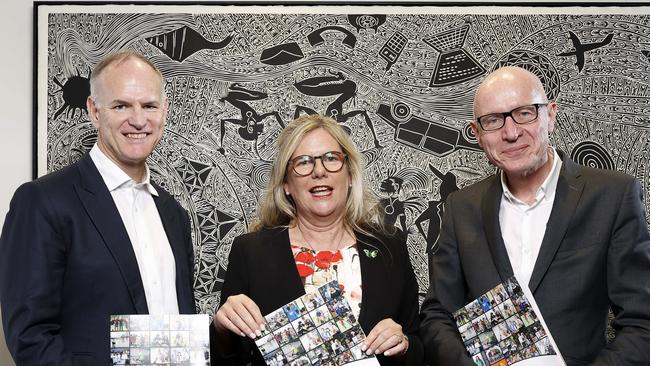News Corp chief Robert Thomson warns that AI ’snippets’ will hurt journalism
News Corp chief Robert Thomson says there are potentially ‘perilous’ consequences for professional journalism if safeguards aren’t imposed on artificial intelligence services.

News Corporation chief executive Robert Thomson has warned of potentially “perilous” consequences for professional journalism if safeguards are not imposed on artificial intelligence services, which, he says, are now operating at an “industrial scale” globally.
Addressing News Corp employees at the Herald & Weekly Times in Melbourne last week, Mr Thomson said the media company was closely monitoring how chatbot services sourced content, and how creators of content might be compensated.
“When AI is being trained, they are often using professional content – ie. our content – and we should be rewarded for that,” he said.
“It will clearly be surfacing individual stories or features that we’ve done, and we need compensation for that.
“And most dangerously with AI and bigger intelligence, they will be synthesising aggregated content from various sources and surfacing a snippet.”
AI chatbot services regurgitate information collated from multiple sources online when questions that are typed into search engines, however, they do not disclose where the information originates.
Mr Thomson said the use of unknown sources to create chatbot responses was particularly problematic for media companies such as News Corp, publisher of The Australian.
“If you remember, Google used to do a paragraph and they were called snippets; well these (AI responses) will be super snippets and particularly perilous for us,” he said.
“It won’t be very clear, or clear enough, which is our content and which is somebody else’s.
“AI has been around for a long time … but you are now seeing it on an industrial scale and in our sector, that’s what we should worry about.”
Mr Thomson also spoke of the changing ways Australians – particularly younger generations – were consuming news through social media platforms such as Chinese-owned video-sharing app TikTok.
“We still have the best journalism but to take advantage of that opportunity we have to understand exactly how, why, when people read and what they want to read,” he said.
“(We have to be) editorially empathetic about the changing reading habits because we know that young people are looking at TikTok and that’s changing their visual socialisation.”
Mr Thomson said “visual snacking” of content by younger audiences meant the business needed to delve into the way news was presented and how much video content should be published.
“We have tremendous opportunity but we are only going to realise that potential if we are very, very conscious of how consumers’ own perspective and own habits are changing,” he said.
He noted that the global economic challenges driven by inflationary pressures and higher interest rates have had a significant impact on many industries, including media.
“Then we have the continuing digital challenges … which is why holding big tech to account and cherishing and valuing content is so important,” he said.
Paying a premium for content was critical to the future of the media industry, Mr Thomson said, referencing the introduction of laws passed in 2021 under the News Media Bargaining Code that required tech giants, including Meta (previously Facebook) and Google, to pay Australian news outlets for content published on their sites.
Mr Thomson said this was being “echoed around the world”.
The News Corp chief executive also spoke of the recent arrest of Wall Street Journal journalist Evan Gershkovich, 31, in Russia last month on suspicion of espionage – a charge that carries a maximum sentence of 20 years in prison.
“It is a tragic situation. Evan was doing what journalists do, reporting in Russia, he had a valid visa, it wasn’t as though he snuck across the border and did anything even vaguely illegal,” Mr Thomson said.
“In Evan’s case we were particularly worried in the first 24 hours because we didn’t know anything, we hadn’t heard anything. That silence was deafening during that period, particularly for his family.”
Mr Thomson said WSJ editor Emma Tucker was supportive of Gershkovich’s family, who are based in Philadelphia, and said News Corp was working around the clock to seek his release.
On Saturday the WSJ released a statement following media reports that Gershkovich had been charged.
“As we’ve said from the beginning, these charges are categorically false and unjustified, and we continue to demand Evan’s immediate release,” it said.




To join the conversation, please log in. Don't have an account? Register
Join the conversation, you are commenting as Logout